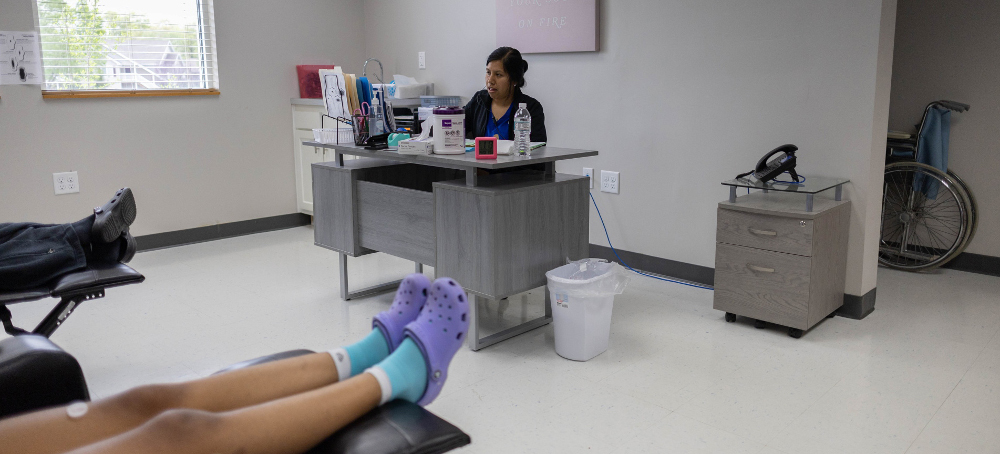Abortion Clinics Saw Record Surge in Out-of-state Patients Post-Roe, Report Says
Ava Sasani Guardian UK Patients are monitored in a recovery room following their surgical abortions at Alamo Women's Clinic in Carbondale, Illinois, on 20 April 2023. (photo: Reuters)
Patients are monitored in a recovery room following their surgical abortions at Alamo Women's Clinic in Carbondale, Illinois, on 20 April 2023. (photo: Reuters) Abortion Clinics Saw Record Surge in Out-of-state Patients Post-Roe, Report Says
Ava Sasani Guardian UK
One in five patients crossed state lines to obtain an abortion in 2023, compared with one in 10 patients in 2020
As abortion bans have rippled across the country, providers in the states such as Illinois – where the procedure is protected by the state constitution – have been inundated with appointment requests. Illinois’s clinics doubled the proportion of abortions provided to out-of-state patients, according to the Guttmacher report – in 2020, 21% of the patients who received abortion care in Illinois came from out of state; in 2023, the figure jumps to 42%.
“People will go to great lengths to access care, and those are the people we need to care for the most,” said Julie Burkhart, co-owner of Hope Clinic, an abortion provider in Granite City, Illinois. Abortion is now almost entirely banned in 14 states.
Hope Clinic sits strategically close to Illinois’s border with Missouri, where abortion is prohibited. In the months after the US supreme court stripped away national abortion protections, the clinic’s waiting room started to fill with patients who had driven from places like Tennessee and Arkansas.
“It’s not just Illinois and Missouri any more, we’ve started seeing patients from across the deep south, people who have come from very far away to get care,” Burkhart told the Guardian.
The patchwork of abortion bans enacted since Roe’s demise means Trust Women, an abortion clinic in Wichita, Kansas, is now the closest provider to patients in Houston, Texas. Kansas saw a 79% overall increase in abortions this year compared with 2020, with most of those abortions provided to out-of-state patients, according to Guttmacher.
“This is a healthcare crisis that is entirely manufactured,” said Zack Gingrich-Gaylord, communications director of Trust Women. “Nobody should be forced to travel 12 hours just to get essential healthcare.”
Like Hope Clinic, the staff at Trust Women worked to ramp up the number of appointments offered each week, a desperate effort to keep pace with this year’s spike in out-of-state patients. The Kansas clinic tripled its staff and stopped offering other reproductive health services, like contraceptives and gender-affirming care. Despite their best efforts, hundreds of patients are still turned away each week.
Providers like Burkhart worry that, as independent clinics are closing across the country, any additional legislative efforts to chip away access will make the resulting patient caseload unmanageable.
“And we are all bracing ourselves for what might happen in Florida,” she said.
The Florida supreme court is currently reviewing the state’s ban on abortion past 15 weeks of pregnancy. If the state’s high court upholds the 15-week ban under consideration, a separate, stricter law would take effect prohibiting abortion after six weeks, before many people know they are pregnant.
Five of the seven justices on the current state supreme court were selected by the conservative governor, Ron DeSantis, fueling the concerns of Burkhart and other abortion rights advocates.
A six-week ban would have dramatic effects outside the state, one of the last bastions of access in the south. In the first six months of 2023, nearly 4,000 people traveled to Florida to obtain an abortion, according to Guttmacher.
If the ban goes into effect, “those people who used to be able to get abortions in Florida are going to be forced to travel very far north, up the Eastern seaboard, past all the states with bans”, Burkhart said. “Some will probably travel to Illinois.”
